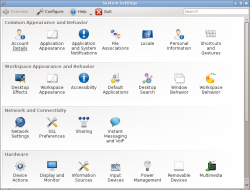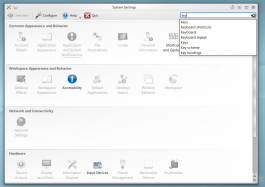System Settings/de: Difference between revisions
Created page with "== Mausgesten ==" |
Created page with "=== Mausgesten einschalten ===" |
||
| Line 68: | Line 68: | ||
The place where you start is "<menuchoice>System Settings -> Input Actions</menuchoice>" | The place where you start is "<menuchoice>System Settings -> Input Actions</menuchoice>" | ||
=== | === Mausgesten einschalten === | ||
In the bottom left corner of the window there is a <menuchoice>Settings</menuchoice> button. Make sure that the <menuchoice>Gestures</menuchoice> checkbox is checked. Set the timout as you see fit. The mouse button might be different for you, I chose 3 for using the right mouse button. If you want input actions to be enabled automatically, check the "Start the input Actions daemon on login" above. | In the bottom left corner of the window there is a <menuchoice>Settings</menuchoice> button. Make sure that the <menuchoice>Gestures</menuchoice> checkbox is checked. Set the timout as you see fit. The mouse button might be different for you, I chose 3 for using the right mouse button. If you want input actions to be enabled automatically, check the "Start the input Actions daemon on login" above. | ||
Revision as of 21:29, 10 July 2011
Funktionen
- Kontrollzentrum für globale KDE Plattform Einstellungen
- Anpassen und Verwalten Ihres Desktops an einer Stelle
- Suchfunktionen helfen beim besseren Finden von Einstellungen
Suche
Systemeinstellungen hat eine Suchfunktion, um eine Einstellung besser zu finden. Tippen Sie einfach ein Stichwort in das Suchfeld in der Werkzeugleiste ein und Systemeinstellungen wird Ihnen entsprechende Module anzeigen, die das Stichwort enthalten und Module ausblenden, die es nicht enthalten. Systemeinstellungen Module können ebenso durch KRunner erreicht werden.
Kategorien
Gemeinsame Darstellung und Verhalten
Kontodetails

Konfigurieren Sie Ihre Benutzerinformationen, Kennwort und Pfade. Sie können ebenso Ihren Sozialen-Desktop-Anbieter einstellen. Programm Aussehen

Konfigurieren Sie Ihr Programm Style, Farben, Symbole, Schriftarten und Smileys. Locale

Language, numeric, and time setting for your particular region. Allows you to apply translation (locale) to whole KDE Desktop or change spellchecker parameters. Shortcuts and Gestures

Configure keyboard shortcuts and mouse gestures.
Hardware
Eingabegeräte

Konfigurieren Sie Ihre Tastatur, Maus und Joystick.
System Administration
Anmelde-Bildschirm

Die Anmeldeverwaltung (KDM) einstellen. Starten und Herunterfahren

Configure your system behavior when starting up or shutting down.
Mausgesten
- KDE SC version 4.4.4
The place where you start is ""
Mausgesten einschalten
In the bottom left corner of the window there is a button. Make sure that the checkbox is checked. Set the timout as you see fit. The mouse button might be different for you, I chose 3 for using the right mouse button. If you want input actions to be enabled automatically, check the "Start the input Actions daemon on login" above.
Creating the Mouse gestures actions group
Right click on the left pane (in an empty area under the list of action groups) and choose , rename that group to "Mouse Gestures" and check the checkbox attached to its name.
Creating a new mouse gesture
From now on I will assume that the new group is called "Mouse Gestures". Right click on and choose (here there are three options but I didn't manage to work with "Send Keyboard Input") using "Command/URL" or "D-Bus Command" you will need to create a gesture and bind an action to it.
To create the gesture
Click on your and select the tab. in the bottom of the screen there is an button (click it). In the box that just opened draw your gesture using the left mouse button.
To bind an action
if you chose simply enter that command/url under the tab at the field.
Examples using Command/URL
Close window
This command will let you close the next window you mouse click on.
Command/URL: wmctrl -c :SELECT:
to close the active window
Command/URL: wmctrl -c :ACTIVE:
Translate clipboard content
This command will display a translation of the current clipboard content.
- Required for this are:
- xclip
- libtranslate
Command/URL: kdialog --title "Translation" --msgbox "`xclip -o | translate -f en -t he -`"
Replace 'en' and 'he' with the desired source and destination language, if you are not sure, a full list of language codes is available from the ISO 639-2 list.
Examples using D-Bus
If you chose D-Bus, here are few examples.
Finding out what to fill where, is done with the help of the "Launch D-Bus Browser", using that browser you can find what method you wish to call in what application object. Using D-Bus we need to fill some fields, the field name will be regular and the content italic.
Runner
This will display the Runner dialog.
Remote Application: org.kde.krunner
Remote Object: /App
Function: org.kde.krunner.App.display
Audacious next/previous/pause/play/stop/repeat track
Remote Application: org.mpris.audacious
Remote Object: /Player
Function: org.freedesktop.MediaPlayer.Next (replace Next with Prev/Pause/Stop/Play/Repeat)
Audacious PlayPause track
If not playing will play, if playing will pause.
Remote Application: org.mpris.audacious
Remote Object: /org/atheme/audacious
Function: org.atheme.audacious.PlayPause
display the actions pop-up. (I am using that to search and translate words)
Remote Application: org.kde.klipper
Remote Object: /klipper
Function: org.kde.klipper.klipper.showKlipperManuallyInvokeActionMenu



